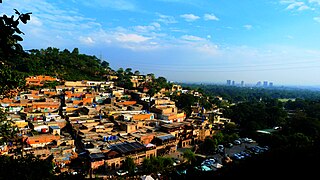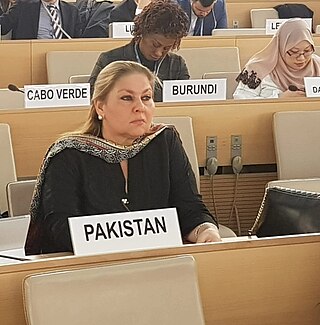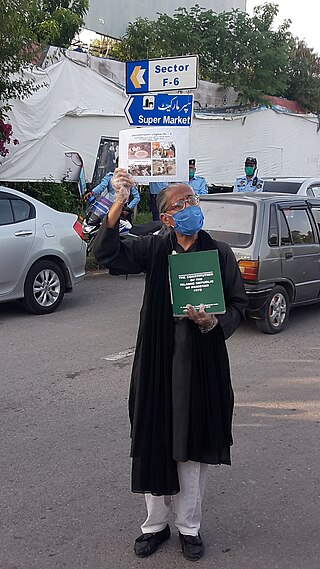Related Research Articles

In the Indian subcontinent, hijra are transgender, intersex, or eunuch people who live in communities that follow a kinship system known as the guru-chela system. They are also known as aravani, aruvani, and jogappa, and in Pakistan, khawaja sira.

Lesbian, gay, bisexual, transgender, and queer (LGBTQ) people in Pakistan face legal and social difficulties and persecution compared to non-LGBTQ persons. Pakistani law prescribes criminal penalties for same-sex sexual acts.

Saidpur is a village and union council (UC-1) located in a ravine in Pakistan in the Margalla Hills, near the Daman-e-Koh overlook, in the Islamabad Capital Territory. It is a Mughal Era village that has a wide spectrum of religious and cultural heritage. It serves as a tourist spot for locals as well as foreigners.
Ayesha Gulalai Wazir is a Pakistani politician who was a former Member of the National Assembly of Pakistan from 2013 to May 2018.

Rabiya Javeri Agha is the Chairperson of the National Commission for Human Rights (NCHR) in Pakistan, and a retired civil servant officer who served in the Government of Pakistan in BPS-22 grade as Federal Secretary. She was the first unanimously elected female President of the Pakistan Administrative Service (PAS) Officers Association, and she has had an extensive career ranging from human rights, women's development, sustainable tourism, energy, finance and trade.
Feminism in Pakistan refers to the set of movements which aim to define, establish, and defend the rights of women in Pakistan.This may involve the pursuit of equal political, economic, and social rights, alongside equal opportunity. These movements have historically been shaped in response to national and global reconfiguration of power, including colonialism, nationalism, Islamization, dictatorship, democracy, and the War on Terror. The relationship between the women's movement and the Pakistani state has undergone significant shifts from mutual accommodation to confrontation and conflict.

Khawar Mumtaz is a Pakistani women's rights activist, feminist author and university professor. She is the Former Chairperson of the National Commission on the Status of Women (NCSW) who served for three consecutive terms from 2013 to 2019.

Tahira Abdullah is a Pakistani human rights activist, women's rights activist, social scientist and supporter of gender equality. She is based in Islamabad.
Bindiya Rana is a Pakistani transgender activist. She is a member of the Khwaja Sara community and the founder and president of Gender Interactive Alliance headquartered in Pakistan. Rana ran for a seat in the provincial assembly in Karachi but lost the election.
Ismat Raza Shahjahan is a socialist-feminist political leader from Khyber Pakhtunkhwa, Pakistan. She is the president of Women Democratic Front (WDF), the deputy general-secretary of the Awami Workers Party (AWP), and a leading member of the Pashtun Tahafuz Movement (PTM).

Jalila Haider is a Pakistani human rights attorney and political activist from Quetta in Balochistan, Pakistan. She is known to be the first woman lawyer from Quetta's Hazara minority, and an advocate for the rights of her persecuted community. She is a member of the Awami Workers Party (AWP), leader of the Balochistan chapter of Women Democratic Front (WDF), and also an activist in the Pashtun Tahafuz Movement (PTM). She founded a non-profit organisation, "We the Humans – Pakistan," which aims to empower local communities in Balochistan by strengthening opportunities for vulnerable women and children.
Anoosh Masood Chaudhry is a Pakistani police officer who serves as the deputy director, Administration, for Elite Police of Punjab, Pakistan since 26 September 2019. She was named as Lahore's best crime fighter for 2018. She became the first female Assistant Superintendent of Police (ASP) from Khyber Pakhtunkhwa province of Pakistan on 11 December 2014.
The Aurat Azadi March was started in 2018 in Pakistan by members of Women Democratic Front, other organizations like Women's Action Forum, Elimination of Violence against Women and Girls alliance, Young Teachers Association, Home-Based Women Workers Union, Awami Workers Party, Awami Jamhoori Party also joined the march on International Women's Day in Islamabad. Aurat Azadi March and Aurat March are organized by different groups of women since 2018. Aurat Azadi March is organized by group of socialist feminists whereas Aurat March is organized by group of liberal feminists. Aurat March was also started the same year by the group of individual women known as "Hum Aurtein" collective in Karachi and Lahore.
The Transgender Persons Act, 2018 is law in Pakistan which was enacted by the parliament in 2018 to legally provide equality to transgender people and to safeguard their rights. The law aims to legally recognise transgender people in the country. It also allows them to legally have the same rights as cisgender people.
Nayyab Ali is a Pakistani transgender activist with over ten years of experience advocating for and defending the human rights of the transgender community in Pakistan. Her work addresses issues such as gender inequality and focuses on economically empowering and improving the livelihoods of transgender individuals. In 2020, she was awarded the Franco-German Prize for Human Rights for her efforts in promoting transgender rights. Ali was also one of the first among thirteen transgender candidates to run for election in the 2018 Pakistan elections. Additionally, she is the first Pakistani to receive the GALA award and the first transgender woman to be elected as co-chairperson of the EVAW/G Alliance. In 2020, the United Nations Development Programme (UNDP) in Pakistan named her a Gender Equality Advocate.

NishaRao is a Pakistani transgender lawyer, advocate and activist. In 2020, she became the first transgender law graduate in Pakistan.
Amna Mawaz Khan is a Pakistani dancer, theatre artist, feminist and political worker. She is founding member of Women Democratic Front.

Tanveer Jahan is a Pakistani human rights defender and trainer. Jahan has been associated with the social development sector in Pakistan for over 35 years. She serves as Executive Director at the Democratic Commission for Human Development, and as National Coordinator of the Pakistan Human Rights Defenders Network. She has served as a member at the National Commission on the Status of Women (NCSW).
Aisha Mughal is a Pakistani transgender rights expert and researcher.
Aradhiya Khan is a Pakistani transgender activist and social worker who works for the transgender community and economically-marginalized.
References
- ↑ "Transgender community of Pakistan launches political party seeking equal rights". gulfnews.com. 23 September 2020. Retrieved 21 November 2020.
- ↑ "Pakistan Elections 2018: Transgender acid attack survivor, Nayyab Ali, running for Parliament, cast her vote". www.timesnownews.com. 25 July 2018. Retrieved 21 November 2020.
- ↑ "Pakistan rights group issues warning ahead of polls". AP NEWS. 16 July 2018. Retrieved 21 November 2020.
- ↑ "Pakistan's Transgender Candidates Step Onto Political Stage". Time. Retrieved 10 November 2020.
- ↑ "Transgender campaigns for acceptance in Pakistan election". www.efe.com. Retrieved 10 November 2020.
- ↑ "Pakistan's first transgender radio host". Pakistan Saga. 10 December 2018. Retrieved 21 November 2020.
- 1 2 3 Malik, Shiza (25 June 2018). "'Only with participation of transgender people will democracy be complete,' says Nadeem Kashish". DAWN.COM. Retrieved 10 November 2020.
- ↑ "Transgenders feel left out of Covid-19 aid conversation". The Express Tribune. 9 April 2020. Retrieved 21 November 2020.
- ↑ "Call for engaging 'Gurus' to develop transgender database | Pakistan Today". www.pakistantoday.com.pk. Retrieved 21 November 2020.
- ↑ "Transgender participation in Pakistan's elections - Rights - Women talk online - DW.COM". Women Talk Online – A forum for women to talk to women. Retrieved 21 November 2020.
- ↑ "Virus pushes Pakistan's transgender dancers out of their homes". Bangkok Post. 21 May 2020. Retrieved 21 November 2020.
- ↑ "Pakistan transgender leader calls for end to culture of 'gurus'". the Guardian. 25 December 2016. Retrieved 21 November 2020.
- ↑ "Mosque not just for transgenders, says Kashish". The Nation. 24 November 2016. Retrieved 21 November 2020.
- ↑ "Pakistan's Transgender Activists Look Ahead to Elections". Time. Retrieved 10 November 2020.
- ↑ seattle times (19 August 2017). "Transgender Pakistanis".
- ↑ "transgender campaigns for acceptance in Pakistan election". The Daily Star. 21 July 2018. Retrieved 10 November 2020.
- ↑ Guramani, Nadir (7 March 2018). "Senate unanimously approves bill empowering transgenders to determine their own identity". DAWN.COM. Retrieved 10 November 2020.
- ↑ "Hoping against hope, Pakistan's transgenders launch election fight". The Express Tribune. 9 July 2018. Retrieved 10 November 2020.
- ↑ "The transgender acid attack survivor running for parliament". BBC News. 19 July 2018. Retrieved 10 November 2020.
- ↑ "Trans elections | Dialogue | thenews.com.pk". www.thenews.com.pk. Retrieved 10 November 2020.
- ↑ "Victory for the third gender | Dialogue | thenews.com.pk". www.thenews.com.pk. Retrieved 10 November 2020.
- ↑ "General Elections 2018: 'Kashish' set to challenge PTI Chairman and former premier – Pakistan". Dunya News. 14 February 2008. Retrieved 10 November 2020.
- ↑ "Hoping against hope, Pakistan's transgenders launch election fight". The Week. Retrieved 21 November 2020.